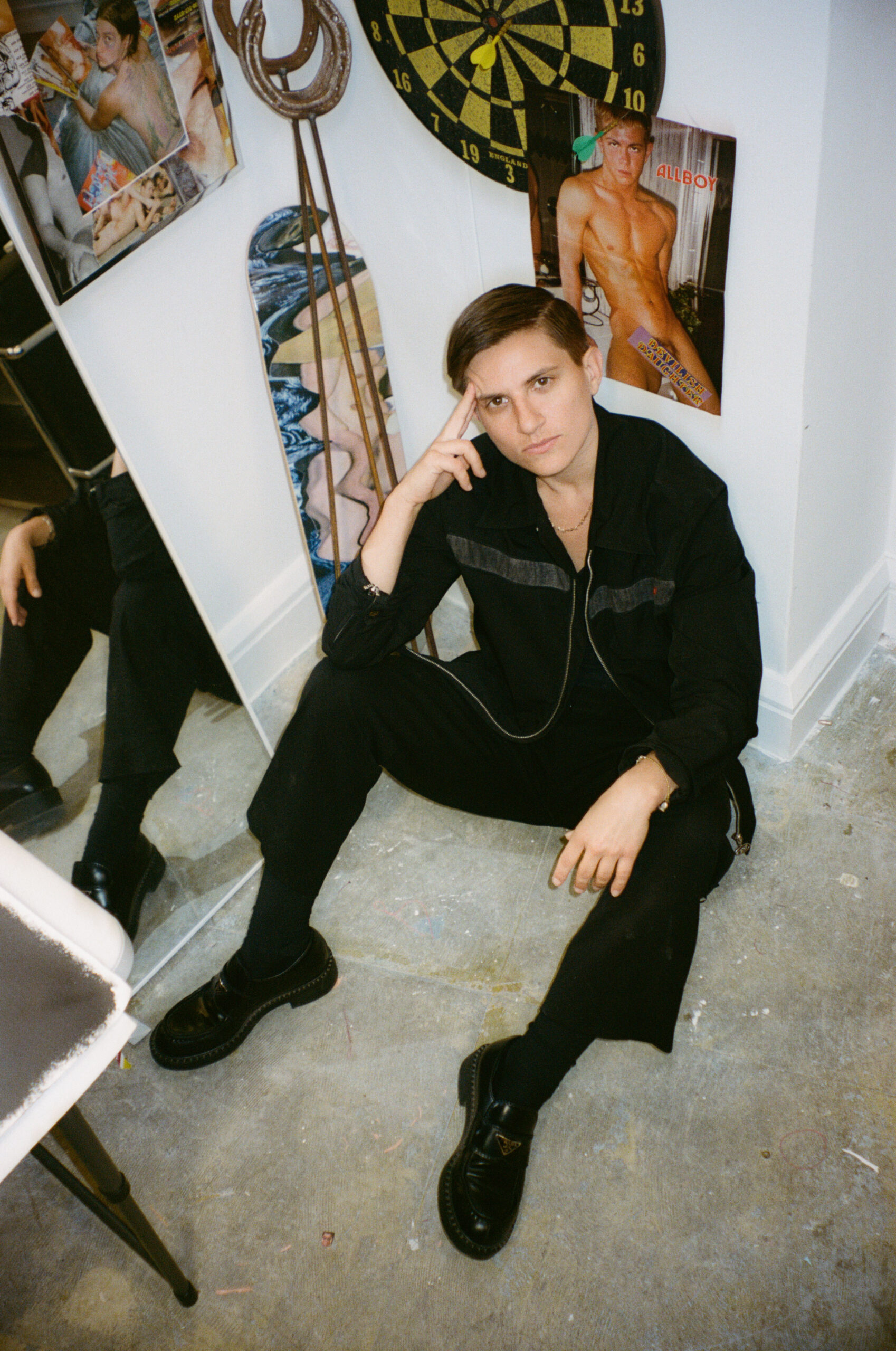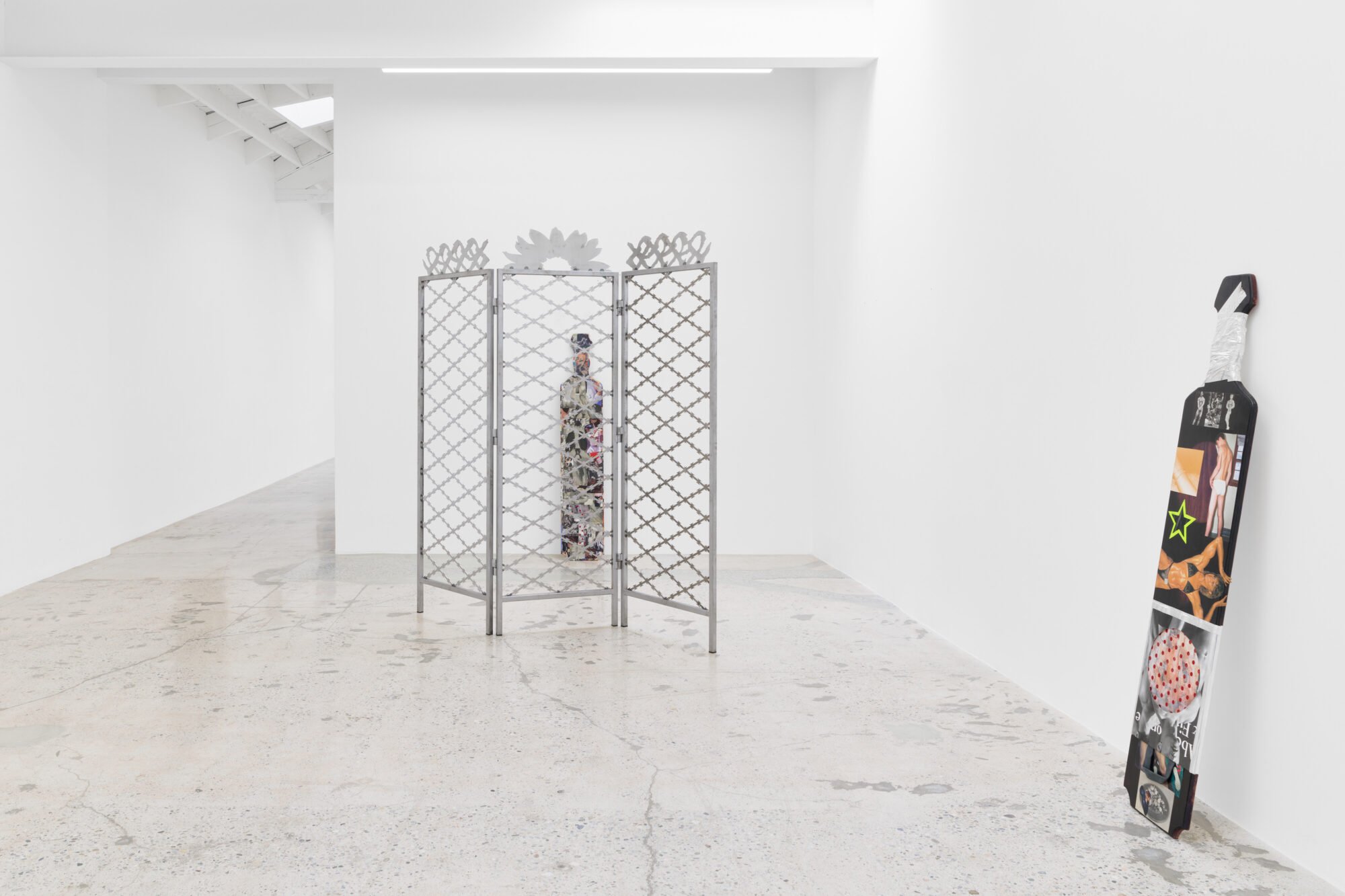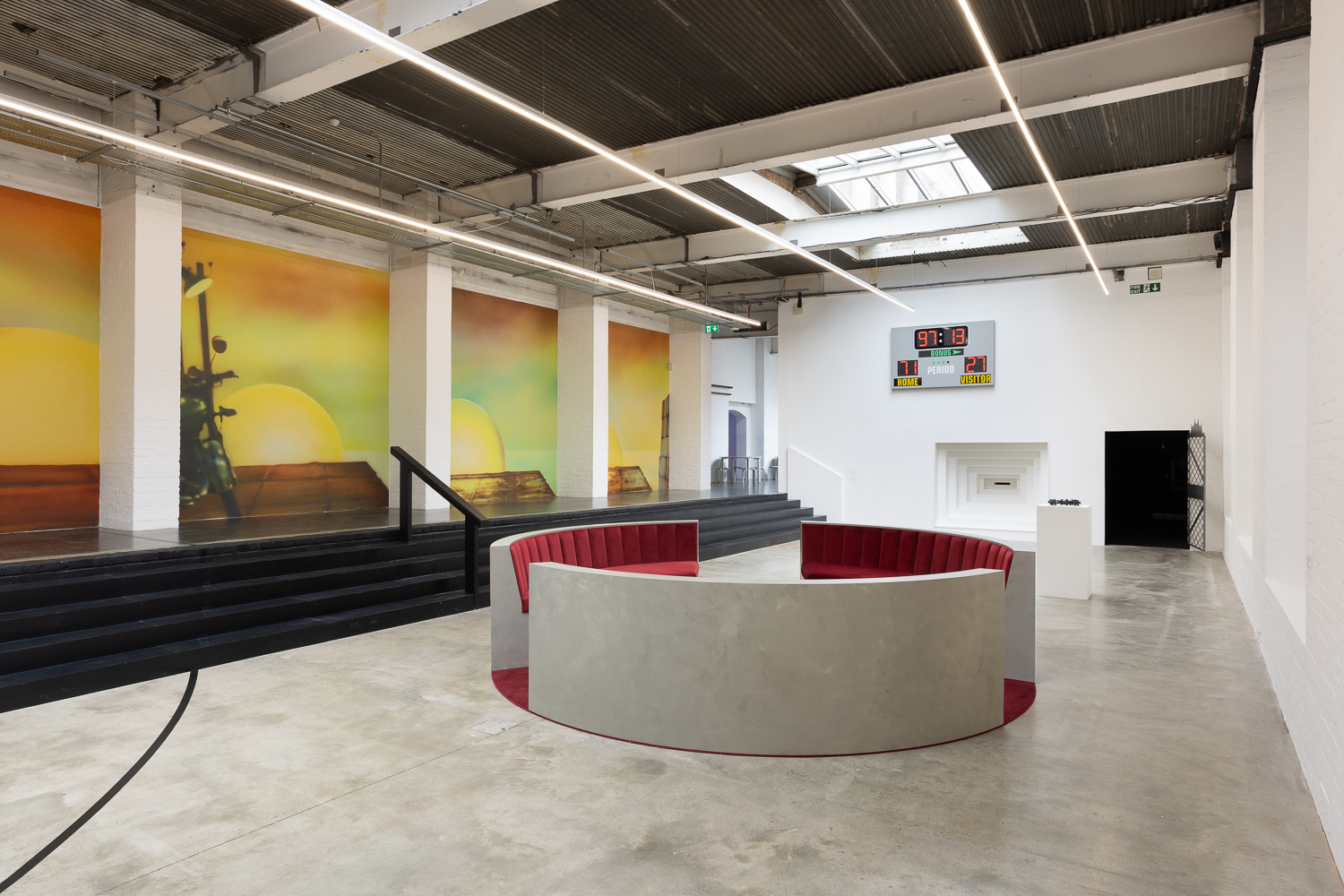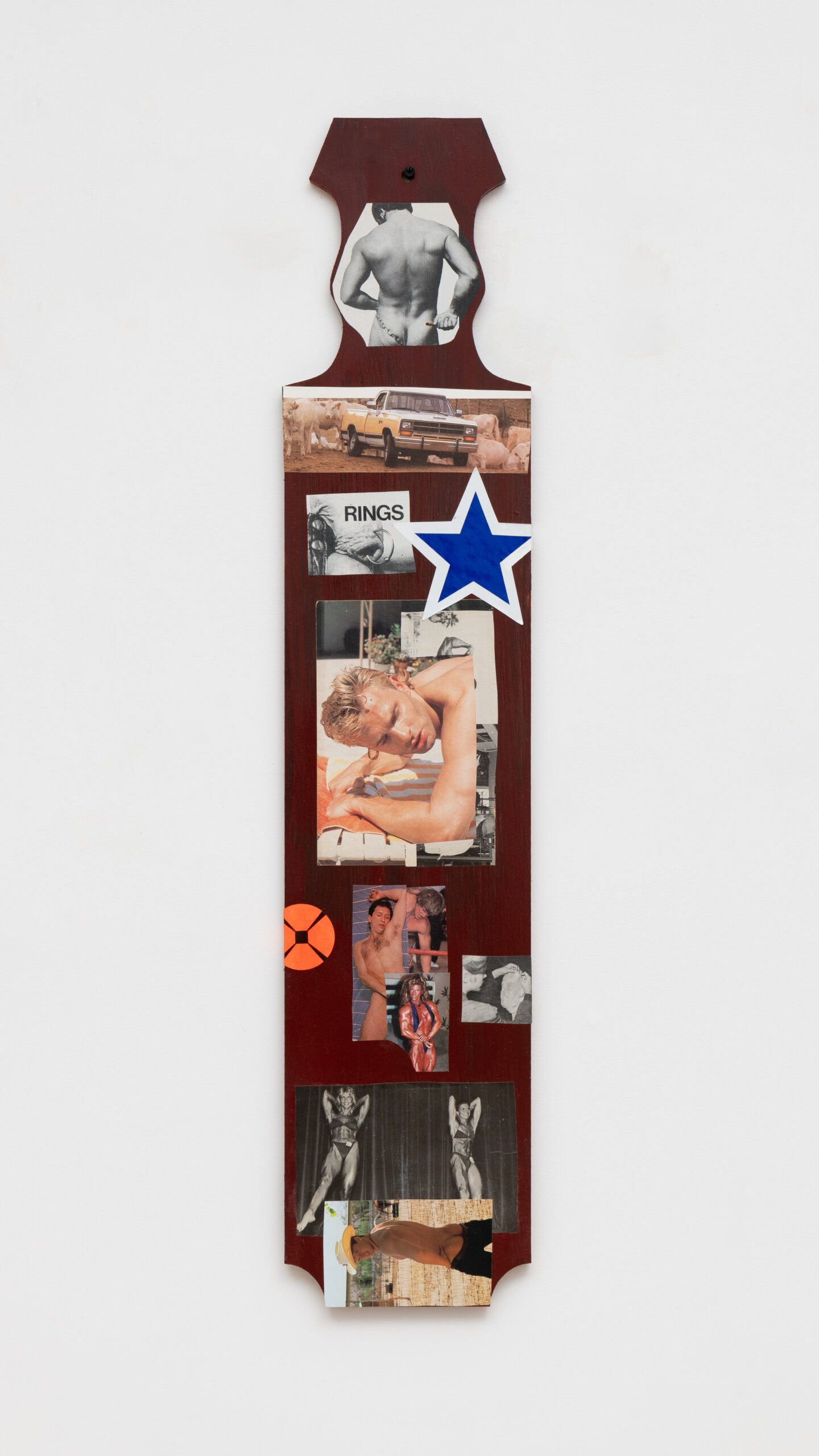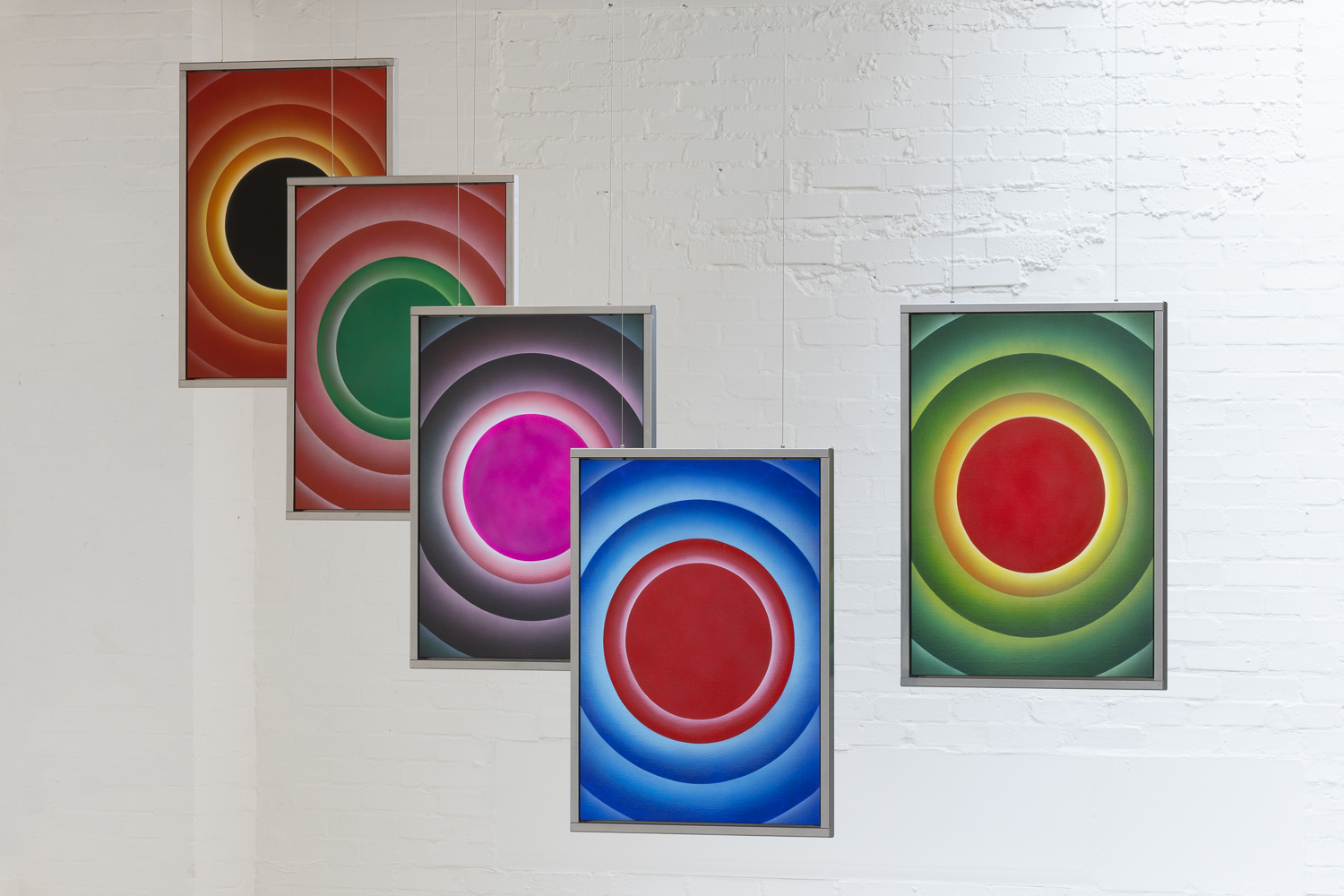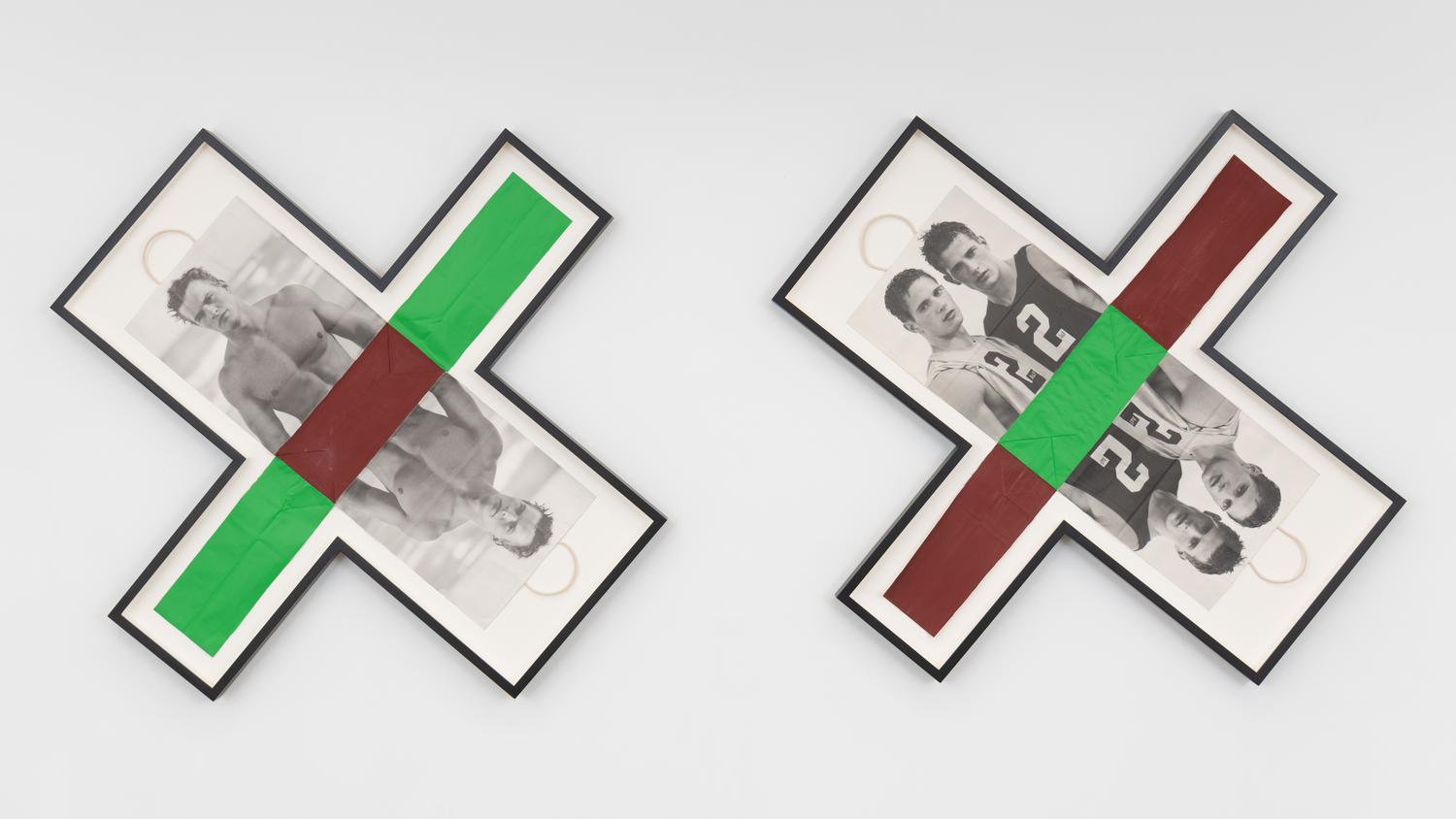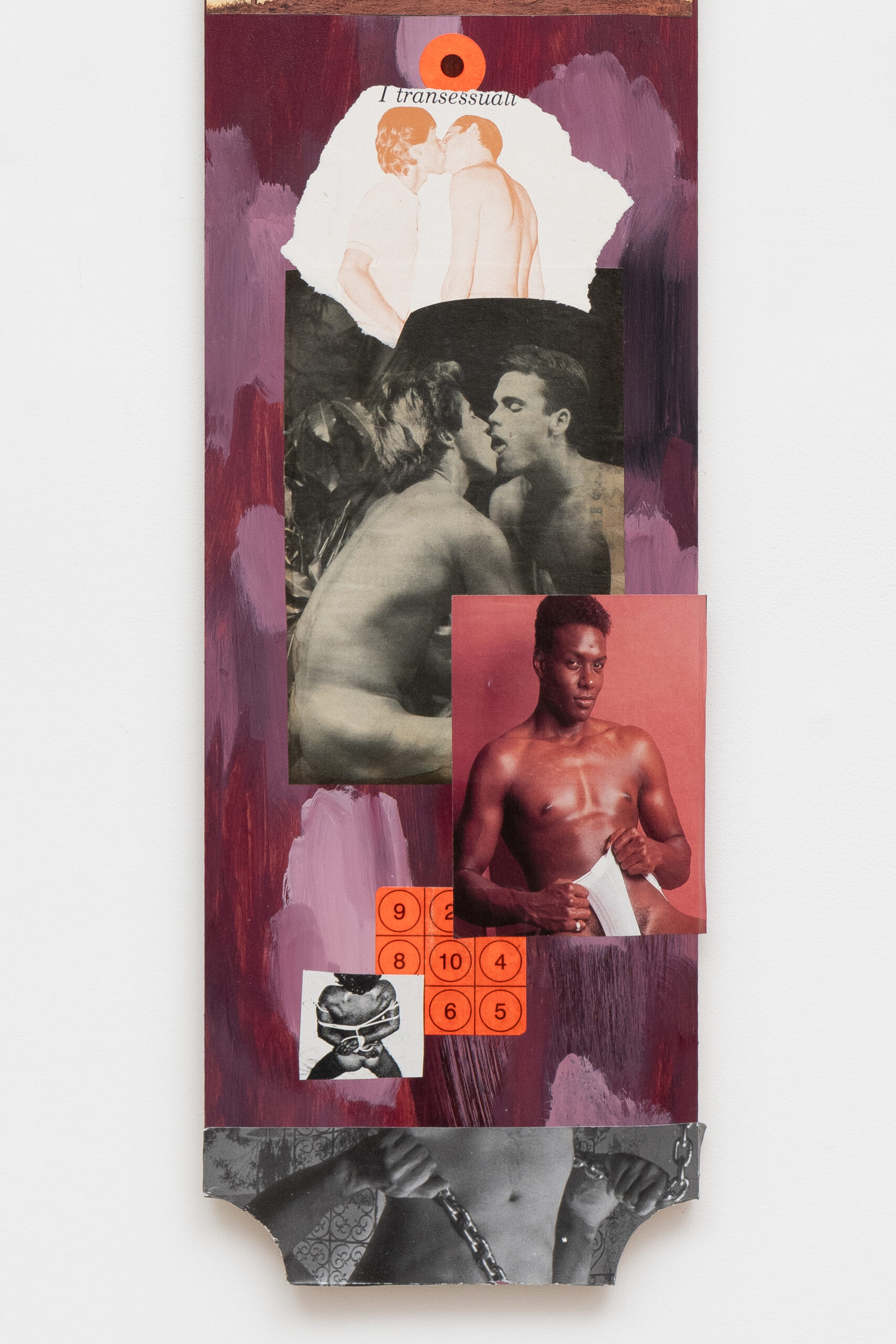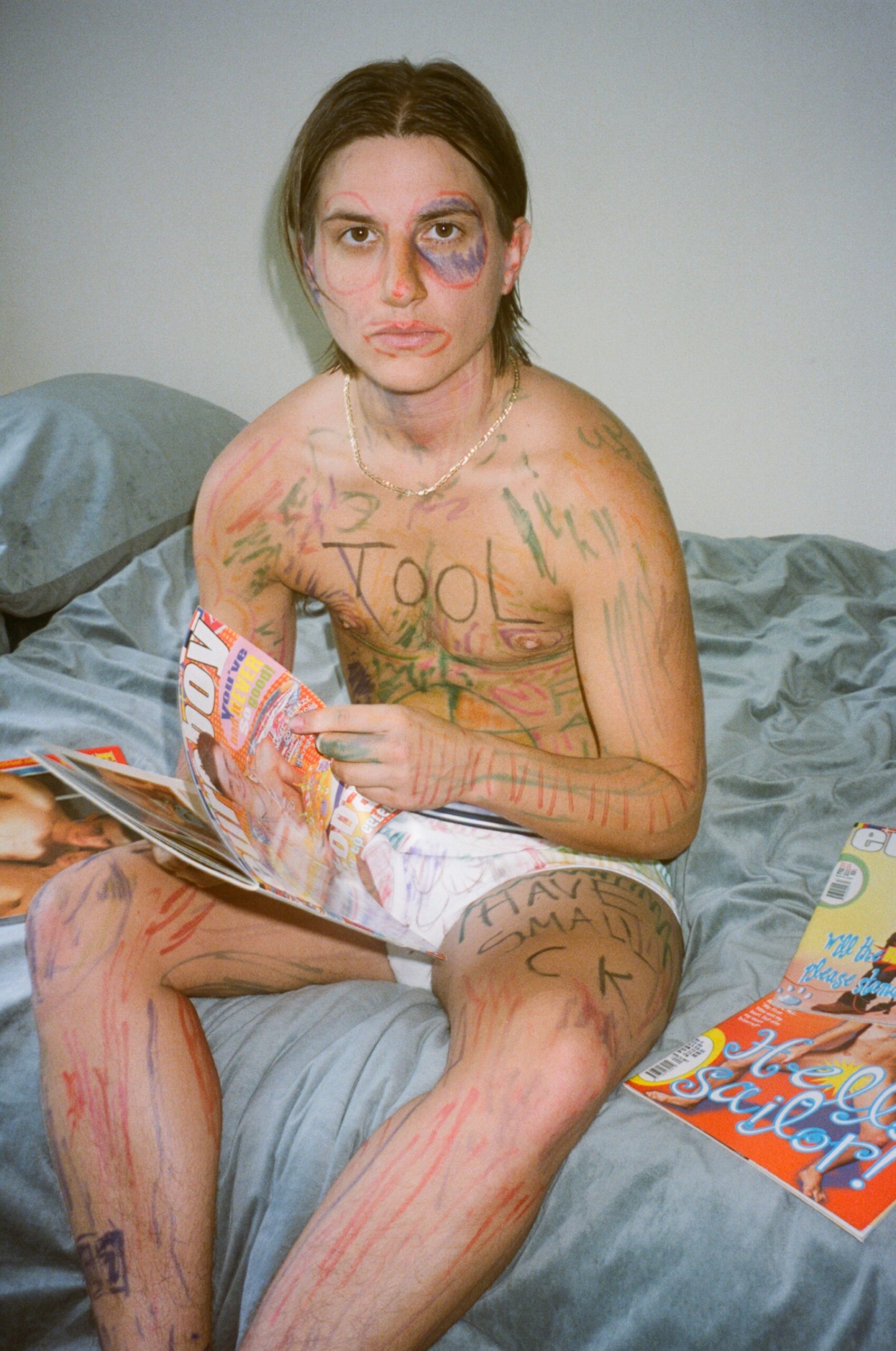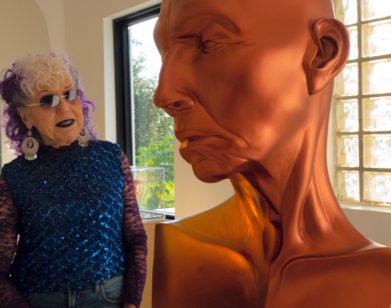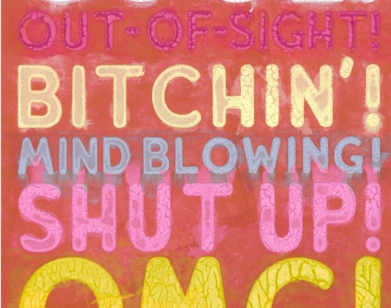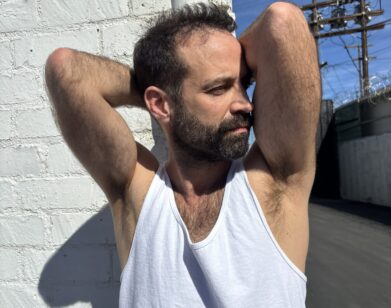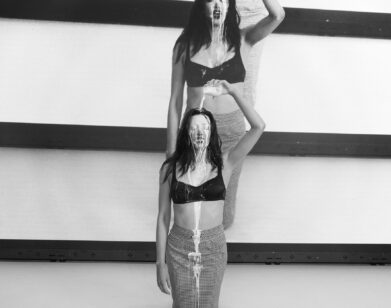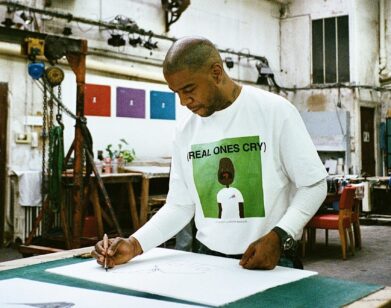STUDIO VISIT
Gray Wielebinski on Alter Egos, Spray Paint, and Sex Dreams
As the final days of summer light shone on Oscar yi Hou’s debut exhibition at the Brooklyn Museum, East of sun, west of moon, another artist’s first show rose across the big ocean blue. This one was Gray Wielebinski’s The Red Sun is High, the Blue Low, at London’s Institute of Contemporary Arts. Yi Hou borrowed his title from a Norwegian fairytale about a pretty peasant married off to a hairy beast; Wielebinski adopted his title from an “atomized” sentence about a red sun. He found the line in the critic Samuel R. Delany’s essay About 5,750 Words, which traces our—the reader’s—gravitational pull towards nuance and gray areas, guesstimations and speculations. “The physically explainable,” wrote Delaney, “has a much wider range than the personally observable.” Write on, man.
Wielebinski’s title seems fitting, especially for an artist who’s been paying pretty close attention to the ways we color our stories, illustrate scenarios, and fill up (or leave vacant) shared spaces. “The show is constantly shifting perspective,” he told me two weeks after the opening.“There’s no center point.” The 32 year-old artist was talking about a conversation pit he installed in the show. Or, maybe, he was referring to the functionless darkroom with a wide peeping hole looking out at hypnotic, bullseye paintings and lo-fi sunset scenes from Fassbinder’s Querelle. Doubling popped up again in our conversation as he shared dreams about brotherly surgeons, getting matching nipples, and places with heavy masculine mirroring. Later, he reminded me that “connection isn’t necessarily sexual.” He went on: “There are other forms of survival and bonding.”
———
JOHNNY BELKNAP: How are you doing?
GRAY WIELEBINSKI: I am a bit sleepy. The show opened two weeks ago, so I had the inevitable emotional crash.
BELKNAP: How did the opening go?
WIELEBINSKI: I was spiraling a bit the week before install, because you’re kind of twiddling your thumbs waiting for it to happen. The install was really smooth and I’m quite happy with it. It really looks how I envisioned it for so long.
BELKNAP: Can you break it down?
WIELEBINSKI: The opening was really fun. Lots of people from my life and times in London came out, so it felt like my opening, my wedding, my bar mitzvah, and my birthday all at once. People were like, “I just met your old friend from high school, who is here.” My first girlfriend in London was chatting with a new Gen Z friend I met recently. And some other friends were like, “Every ex in London is here, I have to go now.” There were five of them.
BELKNAP: You have five exes in London?
WIELEBINSKI: No, a lot of people’s exes and new lovers were there. Which is what I hope for any event bringing people together.
BELKNAP: Can you describe the show?
WIELEBINSKI: It’s site-specific and meant to be experienced. There’s a sound component, and it’s building into and expanding the space itself. There’s a conversation pit in the middle that’s exaggerated in such a way that it makes you feel kind of small. It’s divided in three parts and it’s a bit disarming, but people are actually spending time in it and it’s functioning super well. There’s also a bunker type element. I don’t want these interactive elements to function as a gotcha moment, but they hopefully change your perception of yourself in the space and the space itself. The show is constantly shifting perspective. There’s no center point, so I was really happy with how that came together. And then there’s the frieze of all of the alcoves with the vinyl airbrush reproductions from Querelle. Those had an interesting effect because the film itself is so technicolor and surreal. They feel very flat in a way that can make you feel claustrophobic. It’s very Loony Tunes, Wile E. Coyote painted on the side of a building. I think it’s very ambivalent, and I think it creeps up on you. If you’ve been in the space for a while, it kind of freaks you out or starts to feel a bit overwhelming. I wish you could see it.
BELKNAP: Maybe I can, now that certain things have changed. The Looney Tunes pieces remind me of early Judy Chicago work. When I was at Salon 94, I was super into that stuff, because it was when Judy was working in an auto body shop and my stepdad has his own auto body shop. That whole spray-painting moment 10 or 15 years ago was so big.
WIELEBINSKI: I love that you picked up on that reference because I literally was looking at and thinking about those Judy Chicago pieces and that she went to auto body painting school. I also interviewed Pippa Garner a few months ago, and her relationship to automotive culture and craft and its influence on her work blew my mind.
BELKNAP: There’s also these giant, stuffed animal creature subjects. Have you done any other—I almost want to say trades. I just feel like when you’re in your studio, you’re really in your scientist lair, concocting.
WIELEBINSKI: I love calling it trades though. So good.
BELKNAP: I mean, yeah. Master of trade.
WIELEBINSKI: Obsessed. There’s plenty of time to still find issues with the show, but I feel quite happy with it, and I still feel excited by the ideas it’s generating. I was nervous because it’s on a scale I’ve not had before, and I knew I had to live with it for several months. It feels like I’m moving towards my conceptual practice. When I was working on this other show I have in L.A. that’s opening this month at Anat Ebgi, I wanted to make something kind of messy with my hands, and to your point, like a mad scientist in my studio, which was actually my parents’ garage. I was doing lo-fi collage work, cutting up porn with fraternity magazines and other clippings, and my parents had to tiptoe around little piles of things that to me were meticulously organized. But it felt like a whole other experience from this high scale production. I just feel very tied to ideas, so at some points a certain approach might have its foot on my neck. I haven’t really made textile work in a minute, but I feel strongly about not being tied to one practice.
BELKNAP: What’s the show coming up going to look like?
WIELEBINSKI: Yeah, some of the magazine collages and some of these collage paddles.
BELKNAP: Slapping paddles or canoe oars?
WIELEBINSKI: Fraternity paddles. In the UK they look kind of like cricket bats.
BELKNAP: Do you think the art world has fraternity and sorority?
WIELEBINSKI: That’s a good question. I’m just extremely interested in subcultures and their social norms and mores and rules.
BELKNAP: What’s a rule you’ve recently broken?
WIELEBINSKI: I’ve been a very good boy for a long time. I want to break some rules again soon. All work and no play.
BELKNAP: See, this is why I need to be there.
WIELEBINSKI: I mean, I feel like mayhem is about to start. London is really giving at the moment. There’s some really great shows on. August was a little sleepy, September was a little serious, and I feel like October is going to be a little messy.
BELKNAP: Scorpio season, my favorite. How is Asa [Seresin, Wielebinski’s partner]?
WIELEBINSKI: Asa is good. He’s been helping me with all of my breakdowns and freakouts, and a lot of his ideas are in the show, too. I think he was surprised by the fact that he too had an intense comedown, but it’s a rite of passage. The catharsis has hit now. When I was making the paddles and collage work when we were in California with my family, Asa was recovering from top surgery upstairs from the same surgeon that I went to. So we got matching nips from the same brother doctors. I had a sex dream about the two of them in the OR before I had my surgery.
BELKNAP: Wait, what?
WIELEBINSKI: I don’t know. They have a very… they look like great surgeons. They’re also giving fraternity, and they look like they’re on the high school football team together. They’re giving jock. I guess it was a good omen, because they did a really good job.
BELKNAP: In the last two weeks I’ve gotten three different friends who’ve been like, “I just had a sex dream about you,” and I’m like, noted.
WIELEBINSKI: It’s a good sign. You’re putting out good vibes. Were they people that you would want to have sex with?
BELKNAP: Yeah, I think I’ve had sex dreams with all three of them too.
WIELEBINSKI: Oh my gosh. That’s romantic. Those are requited sex dreams. I am fairly certain that my top surgeons did not have sex dreams about me, sadly.
BELKNAP: It’s nice to be back in New York, though. It was nice to take a year off and then come back. I’ve gained a lot of clarity.
WIELEBINSKI: The thing about being a writer or an artist is that your ability to make work is not totally dictated by you. It’s by having access to things, like money or a studio, so it can feel like a constant state of scarcity or precarity. Feast and famine.
BELKNAP: And New York in particular loves to put on this facade that there is a scarcity of things, and it’s just not true. There is technically enough building space for every person to have a roof over their head. And maybe time is the scarcity element in friendships. So many people are in relationships too, all of a sudden.
WIELEBINSKI: Maybe the New York gay boys are cuffing up.
BELKNAP: My community is not the gay boy. I’m a floater. I was the mascot in high school.
WIELEBINSKI: Were you really?
BELKNAP: Yeah. This is why I’m attracted to your work so much, because it has that funny element. Were you a mascot?
WIELEBINSKI: No. I was the homecoming queen.
BELKNAP: Oh my god.
WIELEBINSKI: What was your school’s mascot?
BELKNAP: Cougar. My senior year, they got a crazy new hyper-realistic costume.
WIELEBINSKI: I need to see a picture of that. Was it a secret?
BELKNAP: It was so psycho, because I had to be like, “I need to say hi to my other friends,” and I would come back really sweaty with my shirt drenched and everyone would say, “The mascot was just dougieing on the football field. The only person I know that dougies is you.” I was trying to make it a secret, but everyone knew. I love committing to a bit.
WIELEBINSKI: As homecoming queen, I very much had people pleasing tendencies, and different groups of friends. I played sports, and also was on the newspaper. But it was in a hyper-visible way. And obviously being a semi-closeted gay, and then very closeted trans, even to myself, it was definitely a facade. The true hack would’ve been to be the school mascot. I needed an alter ego.
BELKNAP: Do you have any alter egos currently?
WIELEBINSKI: I mean, I would dress up 365 days of the year as if it was Halloween for a good five years of my childhood. I was dressed as Wolverine going to the grocery store. I was the Red Power Ranger quite a lot. I think in retrospect, I’m realizing how much I was not connected to myself enough to be fully myself, not just in the literal trans way. I took pride in having this inner secret self, so a part of my adult life has been about having different things going on but not feeling hidden. I do have name-related alter egos. Gray is very often misread as Gary. It happens quite a lot with cold emailing people for fabrication stuff or for the ICA show. But I do quite like when trans guys have their chosen name as a regular guy name rather than like, Asher. They’re like, “It’s Fred.”
BELKNAP: Asher?
WIELEBINSKI: Sorry. I love all of the Ashers out there. My mom also told me, “We were so close to naming you Bernadette.” So I would’ve been Bernie. And when I was maybe 10 to 14, my parents had a Green Acres moment and got this random plot of land in east Texas where we would go on weekends, and we had a donkey and my mom named the donkey Bernadette. Like, wow, you really got that out of your system. It was very humbling. Do you have names that you think of naming a kid or a pet?
BELKNAP: There’s some, but they’re crazy. Ezekiel. We need more Zeke.
WIELEBINSKI: Ooh, love. If there’s anything we take away from this interview, it’s that we need more Zekes.
[Recording cuts out]
WIELEBINSKI: We were just talking about masculinity and hyper-masculine spaces. You said something about you not finding eroticism in institutionalized, homosocial spaces like the fire department or fraternities.
BELKNAP: Growing up in a military family, and as United Methodist Protestants, which is a particular kind of Christianity that’s very all-American and individualistic, I don’t find it super erotic to go from one cult to another cult. I just don’t know what the charge is other than like, “Haha, I fucked a policeman in the butt.” I don’t find that particularly meaningful. In the last Foucault interview that people always cling to, Friendship as a Way of Life, people always forget that he brings up war, saying that war is a place of homosocial contact, and that promotes a sense of male on male camaraderie or companionship. And I think people misconstrue that to mean it’s subverting institutions.
WIELEBINSKI: Totally. It is literalizing, because connection isn’t necessarily sexual. There are other forms of survival and bonding, including trauma bonding.
BELKNAP: A lot of people aren’t super familiar with the sexual hegemony stuff he gets into about sodomy throughout record keeping—he says record keeping instead of history—including taxed sodomy or punished sodomy. There’s a moment where he talks about Machiavelli’s paranoia being rooted in homophobia, which again suggests that if two countries or two different men are at war with each other, they could actually also be in love.
WIELEBINSKI: That’s interesting. This is a lot of Asa’s research, but in western civilization, the terms homosexual and heterosexual were invented around the same time. Heterosexuality often meant a type of a deviant sexuality because to have a sexuality was considered deviant. There’s so much else to say about simplifying the gag of the homosocial space as being gay rather than observing the unraveling of it. You just learn a lot more that way. I feel like with me, a lot of the eroticism is in being shut out of these spaces like a locker room or fraternity and creating a dreamscape of them. For you, maybe it makes sense why you probably don’t find something that’s close to home erotic. Do you have an erotic genre that you are into?
BELKNAP: I love almost getting caught.
WIELEBINSKI: That’s a good one.
BELKNAP: I don’t exactly know what that even entails. It’s not exactly exhibitionism or voyeurism. I love sunshine, when it’s sunny in the middle of the day. I’ve been out of commission for the last year studying and writing on my laptop, so I feel so sexless. Not sexless since I’ve been back in New York, but I have not been enjoying the Grindr hookups.
WIELEBINSKI: Is that a shift?
BELKNAP: I don’t think I’ve ever totally liked it. I want to talk or hang out for a couple hours. I think I am a little bit more of a top in that way, as much as I am not.
WIELEBINSKI: That is a nice way of thinking about topdom. You have to be very present, so it doesn’t feel as nice if you’re totally disconnected from them. You feel like you’re just incidental or something.
BELKNAP: Totally. I have so many more questions. Do you and Asa usually hook up together? Do you want me to stop recording this?
WIELEBINSKI: Maybe that’s a good idea. My parents have a Google alert on.

